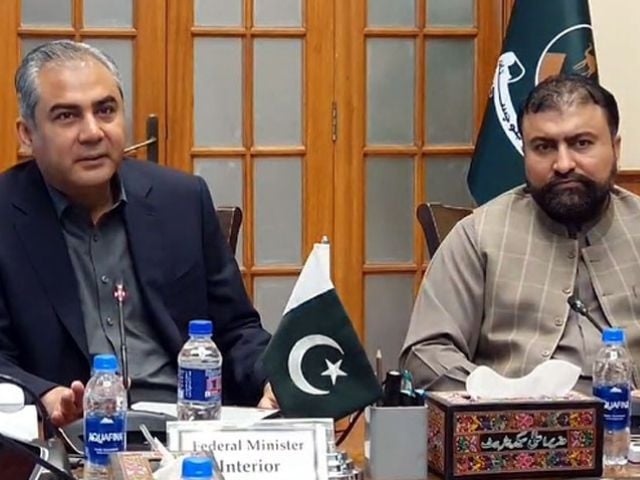Interior Minister condemned the recent terrorist attacks in Balochistan, describing them as unacceptable.
Interior Minister Naqvi Dismisses Need for Major Operation in Balochistan, Claims Single SHO Sufficient to Tackle Terrorism
Interior Minister Mohsin Naqvi has controversially stated that a major military operation is not required to address the terrorism issue in Balochistan, asserting that a single Station House Officer (SHO) could effectively handle the situation. Naqvi made these remarks during a press conference in Quetta, held alongside Balochistan Chief Minister Sardar Sarfraz Bugti, where he emphasized the federal government’s unwavering support for the provincial leadership.
Naqvi’s visit was intended to show solidarity with the people of Balochistan and to assure them that the federal government stands firmly behind the provincial administration. “The federal government is fully backing Chief Minister Bugti in whatever decisions he makes,” Naqvi stated, underlining the support for the local leadership during these challenging times.
Addressing the recent surge in violence in Balochistan, Naqvi expressed deep concern over the attacks, which he deemed unacceptable. He assured that the terrorists responsible for these incidents would soon receive a “clear message.” Despite the violence, Naqvi remained confident that a major operation was unnecessary, reiterating that the terrorists represent only a minor threat that could be managed effectively with minimal resources.
Naqvi clarified that while visible efforts in Balochistan are ongoing, significant actions are also taking place behind the scenes. “These acts of terror are intolerable, but they cannot intimidate us. The terrorists will receive a strong message soon,” he asserted. In response to a journalist’s question, he emphasized that the Balochistan government is alert and determined to confront terrorism with the existing resources and strategies.

The Interior Minister dismissed the need for a large-scale operation, asserting that the terrorists are primarily operating from hidden locations. “If these terrorists had the courage, they would confront us directly. Our forces are well-equipped to handle them, and their elimination will not necessitate extensive operations,” Naqvi explained.
Chief Minister Sarfraz Bugti, who was present during the press conference, acknowledged the difficulties of securing Balochistan’s extensive and rugged terrain. He noted that terrorists often exploit isolated and remote areas to carry out their attacks. Bugti assured that the government is actively addressing these threats with all available resources and strategies.
The recent increase in violence in Balochistan has been marked by a series of tragic events, including target killings and militant attacks. On one of the province’s most violent days, over 40 lives were lost in multiple terrorist attacks across various districts. The deadliest incident occurred in Musakhail, where 23 passengers were executed after being forcibly removed from a bus. In Kalat, an assault on security forces resulted in the deaths of 10 individuals, including both civilians and security personnel.
In response to these attacks, the military took decisive action, eliminating 21 suspected militants and thwarting a major terrorist plot in the Lasbela district. The government’s efforts to combat the violence have been robust, with significant military operations aimed at addressing the immediate threat.
Prime Minister Shehbaz Sharif convened a Cabinet meeting to discuss the security situation and the overall law and order in the country. During the meeting, Sharif reiterated the government’s commitment to eradicating terrorism from Pakistan, pledging to provide the military with all necessary resources to combat the threat effectively. “There is no room for terrorism. The time has come to end it. We will equip the military with whatever resources it needs,” the Prime Minister declared.
The ongoing violence in Balochistan remains a critical issue, with the government balancing immediate tactical responses and long-term strategic planning to restore peace and stability in the region.

